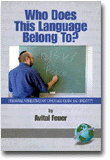
Who does This Language Belong To?
Personal Narratives of Language Claim and Identity
By:
Avital Feuer
Published 2008
In this Hebrew language learning setting, students’ backgrounds and histories are diverse: some were born and raised in Canada, the United States, or South Africa and studied Hebrew at Jewish day schools; others were born in the former USSR, immigrated to Israel as children, and moved to Canada with their families as teenagers; others were children of Israeli emigrants who learned Hebrew at home. This ethnographic qualitative study examines two conflicting camps within the Hebrew class, defined by themselves and Othered by opposing sub-groups as “Canadians” and “Israelis”. As the students and the author negotiate their strong ties to the language with Othering and exclusion by other sub-groups from the dominant speech community, the sentiment of the Israeli emigrant professor regarding her students hangs overhead: “None of them are Israelis. None of them are native speakers of Hebrew.” Who does this language belong to? Which subgroup can declare authenticity as real, rightful owners of the language and its indelible culture and identity?
As language programs worldwide deal with a diverse and heterogeneous student population who enter the classroom categorized as heritage, second, bilingual, foreign, or native language speakers, this book addresses clashing and Othering between sub-groups over the authenticity of the variety of the language and its speakers, and who can rightfully claim the language as their own.
CONTENTS
Chapter 1: Introduction: Who Does This Language Belong To? A Search for Place Between Languages. Chapter 2: Multiple Languages, Multiple Selves: Identity Theories and Sociolinguistics. Chapter 3: Between the Cracks: Hybrid Language and Identity Research. Chapter 4: Navigating the Journey: Insider Perspectives and Methodology. Chapter 5: Convergence in the Hebrew Language Class. Chapter 6: Divergence in the Hebrew Class. Chapter 7: Negotiating Identity Formation Through Language Claiming
REVIEWS
"...an interesting personal narrative and sound empirical evidence on language learning, culture, and instruction. ...this research can be applied to many colonized and Diasporal cultures worldwide." Stacey Long-Genovese in Education Review
-
Paperback978-1-59311-837-2
Web price: $45.04 (Reg. 52.99)
-
Hardcover978-1-59311-838-9
Web price: $80.74 (Reg. 94.99)
- eBook9781607526315

- LAN009050 - LANGUAGE ARTS & DISCIPLINES: LINGUISTICS: Sociolinguistics
- EDU015000 - EDUCATION: Higher
- EDU037000 - EDUCATION: Research
-
 (Re)Envisioning Social Studies Education Research
Current Epistemological and Methodological Expansions, Deconstructions, and Creations
(Re)Envisioning Social Studies Education Research
Current Epistemological and Methodological Expansions, Deconstructions, and Creations
-
 Affirming Identity, Advancing Belonging, and Amplifying Voice in Sororities and Fraternities
Affirming Identity, Advancing Belonging, and Amplifying Voice in Sororities and Fraternities
-
 Effective Alternative Assessment Practices in Higher Education
Effective Alternative Assessment Practices in Higher Education
-
 Expanding the Vision of Faculty Learning Communities in Higher Education
Emerging Opportunities for Faculty to Engage Each Other in Learning, Teaching, and Support
Expanding the Vision of Faculty Learning Communities in Higher Education
Emerging Opportunities for Faculty to Engage Each Other in Learning, Teaching, and Support
-
 Institutional Diversity in American Postsecondary Education
Institutional Diversity in American Postsecondary Education
-
 Promoting Equitable Classroom Practices in Higher Education
Approaches Beyond Curriculum
Promoting Equitable Classroom Practices in Higher Education
Approaches Beyond Curriculum
-
 The Handbook for Aspiring Higher Education Leaders
The Handbook for Aspiring Higher Education Leaders

